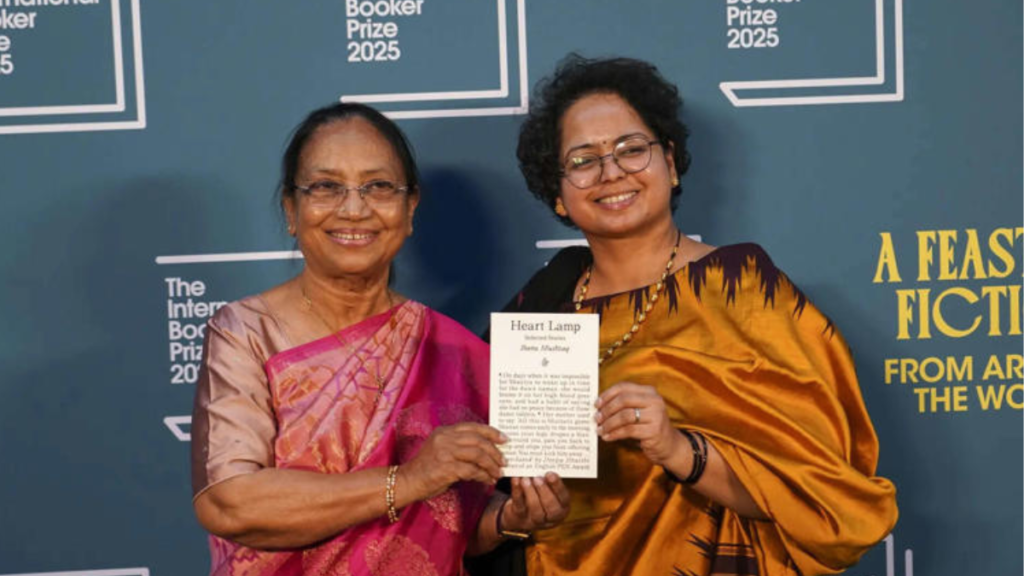Kannada literature has achieved a historic moment on the global literary stage. Banu Mushtaq, a 77 year old writer and activist from Karnataka, has become the first Kannada author to win the prestigious International Booker Prize. Her short story collection Heart Lamp, translated into English by Deepa Bhasthi, received the honour at the Tate Modern in London. This is only the second time an Indian book has won this recognition, and the very first time that a short story collection has been awarded the prize.
The judging panel, chaired by writer Max Porter, praised Heart Lamp as “something genuinely new for English readers.” He described it as a “radical translation” filled with “vibrant and uplifting narratives” rooted in Kannada culture but carrying meaning that reaches far beyond borders. The award not only marks a personal victory for Mushtaq but also places Kannada literature firmly in the global spotlight.
A Thousand Fireflies in One Sky
After the announcement, Mushtaq shared her thoughts with The Times of India. “This feels like a thousand fireflies lighting a single sky. Brief, brilliant and utterly collective,” she said. For her, this was not about personal fame but about the community that helped her reach this moment. “This shows the true potential of Kannada language and literature,” she added.
Mushtaq described the moment as electrifying but also humbling. Despite the recognition, she remains grounded. “My writing will remain the same,” she said. “From travelling in bullock carts to standing on this global stage, it feels surreal.”
A Fearless Voice Born Early
Mushtaq’s writing journey began in her childhood. She wrote her first story when she was in middle school. Public recognition came later when, at the age of 26, one of her stories was published in Prajamata, a respected Kannada magazine.
Raised in a large Muslim family, Mushtaq was known for challenging the rules around her. Her father supported her fiercely, especially when she pushed back against the strict culture of her school. That early encouragement gave her the confidence to become a bold and honest writer.
She made her own life choices, including marrying a partner of her choosing and pursuing careers in both law and journalism. Through these platforms, she advocated for women’s rights and questioned the systems that silence them. “My stories reflect how religion, society and politics demand unquestioning obedience from women. And in the process, they often cause deep harm,” she said.

Kannada Literature: A Literature of Protest
Mushtaq’s fiction is deeply inspired by the Bandaya Sahitya movement in Karnataka. This was a powerful literary wave that used writing as a tool to question caste injustice and social inequality. Mushtaq travelled to many places, listening to the voices of those who were often left unheard. These experiences shaped her stories with honesty and a strong sense of empathy.
Her themes include reproductive rights, caste oppression, questions of faith and structures of power. But her writing never feels distant. It is drawn from real life, from lived moments of struggle and survival. Her stories speak with clarity and compassion while refusing to be silent about injustice.
A Rich and Powerful Body of Work
Though Heart Lamp brought her international attention, Mushtaq has been a significant literary voice for years. She has written six short story collections, a novel, an essay collection and a volume of poetry. Her earlier works were compiled in Haseena Matthu Ithara Kathegalu in 2013. Her most recent book, Hennu Haddina Swayamvara, was released in 2023.
Over the years, she has received many awards, including the Karnataka Sahitya Academy Award and the Daana Chintamani Attimabbe Award. These honours reflect her strong impact on Kannada literature and the themes she continues to explore.
The Voice Remains Rooted
Despite all the global recognition, Mushtaq remains true to her roots. She does not see the prize as a shift in direction but rather as a chance to carry Kannada stories to more people. “The audience may be wider now,” she said. “But the voice will remain mine.”
Banu Mushtaq’s win is not just a celebration of one writer. It is a celebration of a language, a culture and a community of readers and writers who believe in the power of stories. Kannada literature has always been rich and powerful. Now, the world is finally beginning to see it.
ALSO READ
Quick Guide to Delhi University’s Guest Faculty Openings in NCWEB
How a Mentor Made My Exam Prep Less Stressful
After Student Complaints, Himachal Board To Recheck Class 12 English Answer Sheets